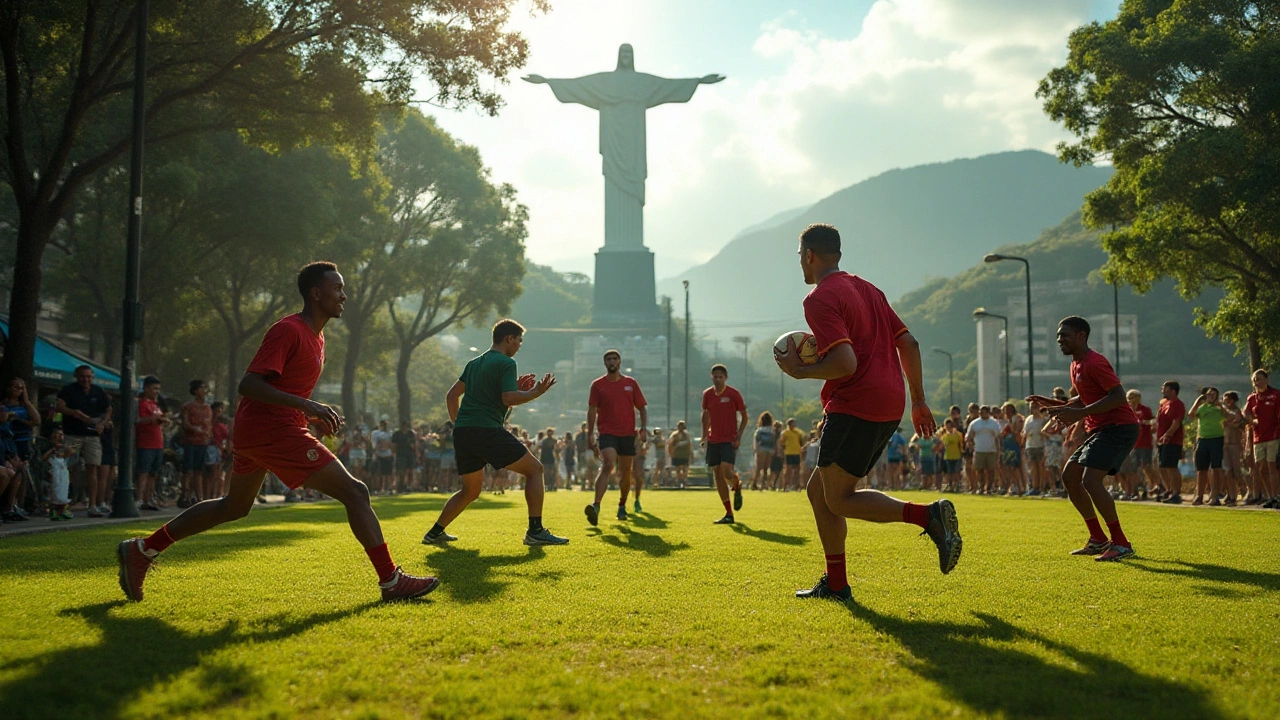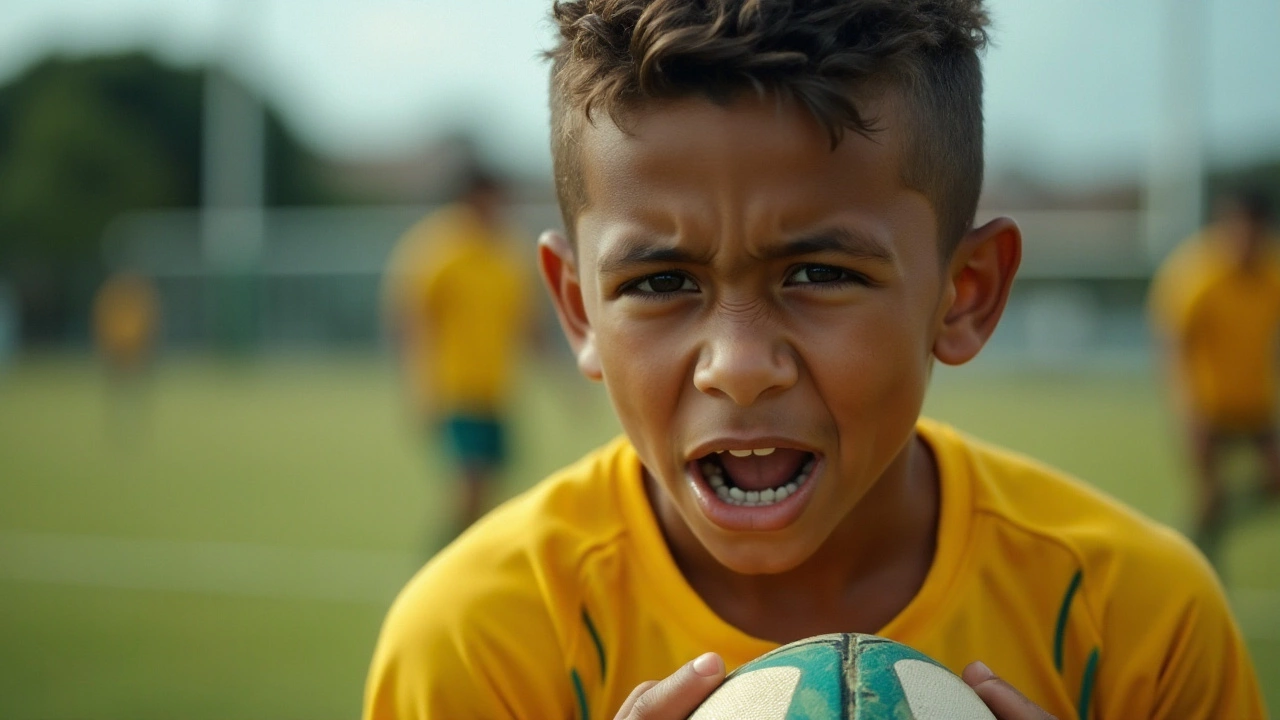Exploring Brazil's Top Sports: A Spotlight on Rugby and More

When people think of Brazil, football often comes to mind as the sport that unites the nation. Yet, over the past few years, Brazil has shown a budding interest in another field sport—rugby. Although rugby may not yet rival football in popularity, it's carving out a niche for itself in this football-loving nation.
The shift is intriguing, with increased participation at grassroots levels and a rising number of spectators warming up to the sport. The passion for sports in Brazil is undeniable, and as rugby fixtures become more prominent on the sporting calendar, many are beginning to see this as a sign of Brazil's expanding sporting identity.
- Brazil's Sporting Legacy
- Rise of Rugby in Brazil
- Key Rugby Fixtures
- Challenges and Developments
- Future Prospects for Rugby
Brazil's Sporting Legacy
Brazil's love affair with sports is legendary. Known for passionate crowds, sizzling samba beats in stadiums, and the unmatchable rhythm of its athletes, this country breathes sports like no other. Football, more than just a sport here, resembles a cultural phenomenon entwined with national pride and identity. Since the days when Pelé dazzled the world with his spellbinding moves on the field, Brazilians have cherished their football heroes, many seeing them as national treasures. From the streets of São Paulo to the beaches of Rio, children grow up dribbling with oranges, dreaming of World Cup glory. Alongside a burning passion for football, Brazil has branched out into other sporting arenas, backed by the same fiery spirit that colors their favorite game.
Spanning decades, Brazil's Olympic achievements have also painted a picture of a diverse sporting nation. Whether it's volleyball, with its thrilling victories, judo, boasting agile grapplers, or athletics, showing speed and endurance, Brazil has made quite an impressive mark. Names like Ayrton Senna have waved not just to the spectators but driven into the country's heart, making Formula 1 a beloved sporting spectacle as well. Brazil is celebrated for hosting great sporting events, like the FIFA World Cup and the Olympics, which have not only showcased their organizational skills but their unyielding love for all things sports. In nurturing talent across different fields, Brazil continues to foster a spirit that thrives on competition, reverence, and undeniable enthusiasm.
Rugby Brazil is making its own headway despite football's immense shadow. With sevens rugby being introduced in the Olympics, Brazilians have found a new sporting passion. Slowly but surely, rugby is cementing its place within the Brazilian sporting landscape. Driven by grassroots initiatives and international exposure, the sport is receiving attention from fans and athletes alike. While it’s an uphill battle to reach football's status, rugby's growth is a testament to Brazil's ever-evolving sporting identity. As more and more people engage with the game, players and fans alike are pushing for greater recognition on international platforms.
“Sport is the nations, and nations are the sport,” said an anonymous sports journalist, perfectly capturing Brazil’s integral connection to sports. This quote underscores the Brazilian spirit, one that emboldens participation and exudes pride, no matter the game. This spirit is what perhaps makes the integration of new sports into Brazilian culture such a possibility and a reality.
The interplay between tradition and innovation in Brazilian sports enriches its global appeal and enhances its vibrant culture. As the nation moves towards embracing sports like rugby, the legacy of icons and achievements provides a solid foundation upon which new stories are written. Such interplay not only highlights the country's vast sporting prowess but also points towards an exciting future where football, rugby, and beyond coexist, celebrated by enthusiasts eager to cheer their heroes to victory.
Rise of Rugby in Brazil
Brazil, a country synonymous with football, is witnessing a fascinating cultural shift as the sport of rugby begins to rise in prominence. Though traditionally overshadowed by the nation’s football fervor, rugby is now carving a notable presence within Brazil’s competitive sports scene. This transformation did not happen overnight; it follows years of dedicated effort by players, coaches, and rugby enthusiasts working to introduce and promote the sport across various regions. The turning point came around the early 2010s, catalyzed by strategic development programs and increased investment in sports infrastructure, which gave rugby enthusiasts the platform they needed to advocate for the game more boldly.
One of the most significant developments driving rugby’s rise has been the inclusion of rugby sevens in the 2016 Rio Olympic Games, which sparked a surge of interest across the country. The home advantage provided Brazilian athletes with an unprecedented opportunity to showcase their talent on a global stage. Despite tough competition from more experienced teams, Brazil's inclusion in the Olympics put a spotlight on the sport, encouraging a wave of young Brazilians to pick up a rugby ball. The Brazilian Rugby Confederation (Confederação Brasileira de Rugby) played an instrumental role in this growth by increasingly organizing national and international fixtures, leading to heightened visibility and interest in the sport.
The efforts to spread rugby across Brazil have also involved grassroots programs aimed at youth engagement, with schools across the nation beginning to incorporate rugby into their physical education syllabus. This initiative not only introduced the sport to a younger audience but also helped break down social barriers by promoting inclusivity and teamwork. Names like Lucas Duque and Moisés Duque have become synonymous with Brazilian rugby stardom, inspiring the next generation of players. Rugby Brazil continues to gain momentum, as evidenced by how clubs are cropping up across the country, nurturing new talents and expanding rugby's reach beyond Rio de Janeiro and São Paulo into smaller towns and cities.
Popular Brazilian sports like football remain the frontrunners in terms of viewership and participation, yet the unique dynamics of rugby have begun to captivate a diverse fan base. Engaging communities that previously had little exposure to the sport, rugby brings with it a distinctive feature set of strategy and pace that appeals to Brazilians hungry for a new kind of athletic endeavor. By fostering a sports culture that values strength, camaraderie, and respect, rugby is positioning itself as a force to be reckoned with in Brazil’s extensive sporting pantheon.
"Rugby in Brazil is becoming more than just a game; it's growing into a community that celebrates diversity and passion for sport," says a spokesperson from the Brazilian Rugby Confederation, highlighting the cultural impact that rugby is having on the nation.
According to data released in recent years, participation in rugby has seen a steady climb, suggesting promising potential for long-term growth. As more local clubs gain traction and schools embrace the sport's inclusion, Brazil is crafting an environment where rugby can thrive and continue to coexist alongside the nation’s beloved football. It's an era of exploration and discovery for sports enthusiasts in Brazil, with Brazil sporting success taking on new horizons as rugby players head into international competitions carrying the aspirations of a burgeoning sporting revolution.

Key Rugby Fixtures
Rugby might be emerging in Brazil, but some fixtures have truly put the sport on the map in this football-centric country. One such event is the Campeonato Brasileiro de Rugby, also known as the Brazilian Rugby Championship. This annual tournament has become a cornerstone for the sport in Brazil, showcasing the best local talent and igniting regional rivalry. Teams from all over the nation compete, bringing with them the hopes and dreams of new rugby enthusiasts. This championship has not only helped raise the sport's profile but has also encouraged more young people to pick up the oval ball, dreaming of wearing their national colors.
Perhaps one of the biggest milestones for rugby in Brazil was hosting the 2016 Summer Olympics in Rio de Janeiro, where rugby sevens made its Olympic debut. The event was crucial as it introduced rugby to a wider Brazilian audience unfamiliar with the sport's fast-paced, exciting dynamic. Though Brazil did not clinch a medal, the exposure was instrumental in growing the sport's fan base. The matches were intense, with teams from powerhouse nations like Fiji and New Zealand demonstrating the infinite possibilities within this sport. It was a spectacle young and old alike found magnetic, and it sparked new interest that has been nurtured by local leagues.
The popularity of rugby in Brazil is also boosted by regional tournaments and international friendlies. The South American Championship, which features national teams from Uruguay, Chile, Brazil, and Argentina, provides another platform for testing skills against some of the continent's best. Many rugby fans look forward to these clashes, as they offer a vibrant display of skill and sportsmanship. Friendly matches against other international teams have similarly contributed to the sport's allure, offering valuable experience and a stage for Brazil to prove itself. These fixtures serve as excellent opportunities for players to develop, and each game drives home the importance of rugby in Brazil's diverse sports landscape.
In the domestic sphere, the Taça Tupi, or the Tupi Cup, serves as an essential stepping stone for clubs outside the top-tier championship. This competition is vital as it allows smaller teams from across the country to cut their teeth and climb the ranks. The Tupi Cup's unpredictability often results in thrilling matches that can turn the tide for budding clubs and players alike. It's within these fixtures that the heart and soul of Brazilian rugby is forged, creating an environment ripe for up-and-coming athletes to shine. A strong showing in these competitions can transition clubs into the more prestigious Campeonato Brasileiro, offering them a bigger stage and an opportunity for greater accolades.
Interestingly, according to the Confederação Brasileira de Rugby, interest in school competitions has soared recently, with many educational institutions embracing rugby as part of their sports programs. These fixtures play a powerful role in grooming the next generation of rugby stars. Schools compete fiercely for local and national titles, teaching students the values of teamwork, strategy, and endurance. Such grassroots fixtures ensure a steady pipeline of talent for Brazil's rugby future, while also instilling a deep love for the sport. Their success stories could one day form the backbone of a national team that might compete on the world stage, reminding us all of the transformational power of sporting events in uniting and empowering people.
Challenges and Developments
As rugby gains ground in Brazil, adopting the sport at a national level has not been without its hurdles. One of the primary challenges is the already entrenched culture of football, which has enjoyed generations of passionate following. Convincing young athletes and enthusiasts to turn their attention to a new sport requires not only showcasing the excitement and skill involved but also providing ample opportunities to engage in rugby.
Another significant obstacle is the lack of infrastructure dedicated to rugby. In a nation where football fields abound, finding and establishing rugby pitches is a task that has needed innovative solutions. The Brazilian Rugby Federation (CBRu) has taken steps to address this by promoting school programs and collaborating with local authorities to make existing spaces more versatile for rugby training and matches.
The financial aspect also poses a challenge. Funding for rugby is not as abundant as for more established sports, which affects everything from player development programs to the maintenance of facilities. Many clubs rely heavily on volunteers and local sponsorships, which can restrict the professional growth of the sport. Investing in rugby means nurturing the sport from the grassroots level up and encouraging businesses to see the potential in supporting this emerging field.
"Rugby in Brazil is a sport with incredible potential; it's growing slowly but surely," stated Agustín Danza, CEO of the Brazilian Rugby Federation, highlighting the promising future despite difficulties.
On a more positive note, the exposure from international tournaments has sparked curiosity and support for rugby throughout Brazil. For instance, the Brazilian rugby team seizing victory in regional fixtures has made headlines, drawing attention and increasing the sport's profile. These successes can inspire new players and attract spectators, contributing significantly to rugby's development across the country.
Educational initiatives have also played a pivotal role. Programs targeting schools aim to educate students about rugby's rules and values, focusing on sportsmanship and teamwork. Such initiatives are essential, not only for cultivating the next generation of players but also for fostering a wider appreciation among the general public. This grassroots engagement is the bedrock that can sustain the sport's growth over time while preserving its unique aspects.
As more communities open up to the idea of embracing rugby, partnerships between local governments and sports organizations become increasingly crucial. These partnerships can help secure necessary funding and resources to build infrastructure, increase accessibility, and ensure the sport continues on an upwards trajectory. By overcoming these early challenges, Brazil can demonstrate its capacity for sporting diversity and offer its citizens a richer tapestry of athletic opportunities.

Future Prospects for Rugby
As Brazil continues to foster a growing interest in rugby, the future looks promising for this dynamic sport. With an increasing number of local clubs springing up across the nation, the sport is becoming more accessible both to participants and fans. One key factor in rugby's potential rise is the support from schools and universities that have started to incorporate rugby into their sports programs. This grassroots development is essential, providing young talents with the opportunity to learn and perfect their skills in a structured environment.
Looking ahead, Brazil's ambition is to become a competitive force on the international stage. The Brazilian Rugby Confederation (CBRu) has been working tirelessly to develop domestic competitions and host high-profile events, which bring more visibility and credibility to the sport. These efforts not only help to build a solid fanbase but also inspire current and future athletes. The enthusiasm from these events is often palpable, and as the sport becomes more ingrained in Brazilian culture, it's likely we will see increased investment from both private and public sectors.
It is also essential to consider the influence of international expertise. Many teams are beginning to hire experienced foreign coaches to guide their players, combining local talent with global strategies. This not only elevates the level of play but also increases the chances of Brazilian teams performing well in international competitions. As these coaches share their knowledge, they'll foster a generation of homegrown trainers who can further advance the sport across the country.
"Rugby has the potential to be a major sport in Brazil if the right structures are put in place," said Gareth Davies, a prominent figure in the rugby community. "With the right support, Brazil can produce players who will not only shine locally but also make a mark internationally."
Another exciting direction is the use of technology in coaching and training. Many clubs are utilizing video analysis tools to assess player performances and tweak strategies efficiently. This tech-savvy approach is crucial in maintaining a competitive edge. Strengthening these aspects will inevitably raise the profile of rugby in Brazil, encouraging a larger audience to engage, and possibly partake in the sport themselves.
Beyond mere entertainment, the social benefits of rugby are substantial. The sport promotes teamwork, discipline, and fitness, which are invaluable to communities. As more Brazilians embrace these ideals, rugby could emerge as a profound force for positive change in society. The challenge now lies in sustaining this growth momentum while ensuring that rugby remains an attractive and inclusive sport for all.
